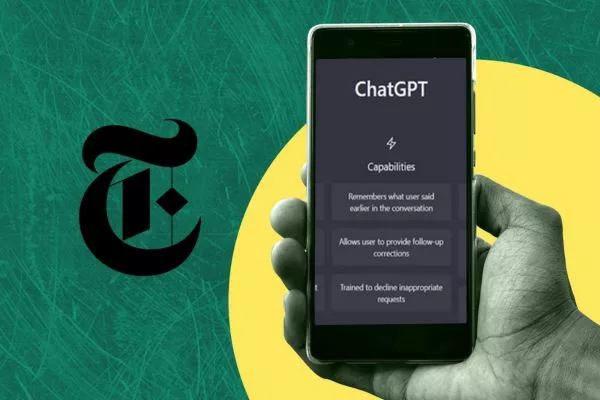The New York Times Company has started a unique debate by filing a lawsuit against Microsoft Corporation and OpenAI (including various OpenAI entities) in the United States District Court, Southern District of New York. The basis of this lawsuit and the objections that the 170-year-old news outlet has against generative AI tools like Microsoft’s Bing Chat and OpenAI’s ChatGPT are detailed below, shedding light on the intricacies of this legal action which will likely have a significant impact on entities like Microsoft and OpenAI, as well as other artificial intelligence products.
The crux of the matter is that AI products are created using large language models which are purified using copyrighted materials from The Times, alleges the 69-page-long lawsuit.
According to The Times, these materials include news articles, opinion pieces, and other journalistic content, all of which are created originally and through extensive hard work. The Times claims that these copyrighted contents are being used by AI products to develop and enhance their effectiveness.
The Times, an independent news outlet for the past 170 years, prides itself on providing comprehensive reporting and analysis on a variety of topics. These materials are protected under copyright law. The Times accuses AI-driven software of infringing on this right and also jeopardizing the integrity of journalism by potentially offering content based on the past work of other journalists.
The lawsuit also outlines how AI-driven software offered by Microsoft and OpenAI’s generative AI tools function by training their AI models using The Times’ copyrighted materials, producing substitutes and rehashed versions, and thereby depriving The Times of revenues obtained from subscriptions, licensing, advertising, and affiliate income. Additionally, it undermines the relationship between the original creators and the readers.
AI-generated content is often criticized as being hallucinatory, and there have been instances in the past where AI-generated content containing false information has been attributed to The Times, potentially tarnishing its carefully cultivated image over the past 170 years. The lawsuit seeks to hold OpenAI accountable for copyright infringement, demanding billions of dollars in damages for unlawful copying and use of its content.
OpenAI’s response to the NYT lawsuit
OpenAI has responded to The Times’ lawsuit by stating that AI tools have been created to assist individuals in solving complex problems beyond their abilities. It is also noted that the usefulness of these tools is evident from their adoption by 92% of Fortune 500 companies.
Also Read:
Real Estate Commission Lawsuit Explained
Gina Carano files a $75K lawsuit against Disney and Lucasfilm with Elon Musk’s help

 Euan Blair Net Worth 2024: How Much is Tony Blair’s Son Worth?
Euan Blair Net Worth 2024: How Much is Tony Blair’s Son Worth? David Copperfield Net Worth 2024: How Much is the Novel by Charles Dickens Worth?
David Copperfield Net Worth 2024: How Much is the Novel by Charles Dickens Worth? Noel Biderman Net Worth 2024: How Much is the Canadian Internet entrepreneur and business professional Worth?
Noel Biderman Net Worth 2024: How Much is the Canadian Internet entrepreneur and business professional Worth? Adam Selipsky Net Worth 2024: How Much is the CEO of Amazon Web Services, Inc. Worth?
Adam Selipsky Net Worth 2024: How Much is the CEO of Amazon Web Services, Inc. Worth? Ken Langone Net Worth 2024: How Much is the American Businessman Worth?
Ken Langone Net Worth 2024: How Much is the American Businessman Worth? Anthony Geisler, Xponential Fitness Founder and CEO Suspended “Indefinitely” Amid Fraud Allegations
Anthony Geisler, Xponential Fitness Founder and CEO Suspended “Indefinitely” Amid Fraud Allegations Navigating Forex Brokers: Choosing the Right Partner for Your Trading Journey
Navigating Forex Brokers: Choosing the Right Partner for Your Trading Journey Navigating the Complexities of MT4: A Comprehensive Guide for Beginners
Navigating the Complexities of MT4: A Comprehensive Guide for Beginners